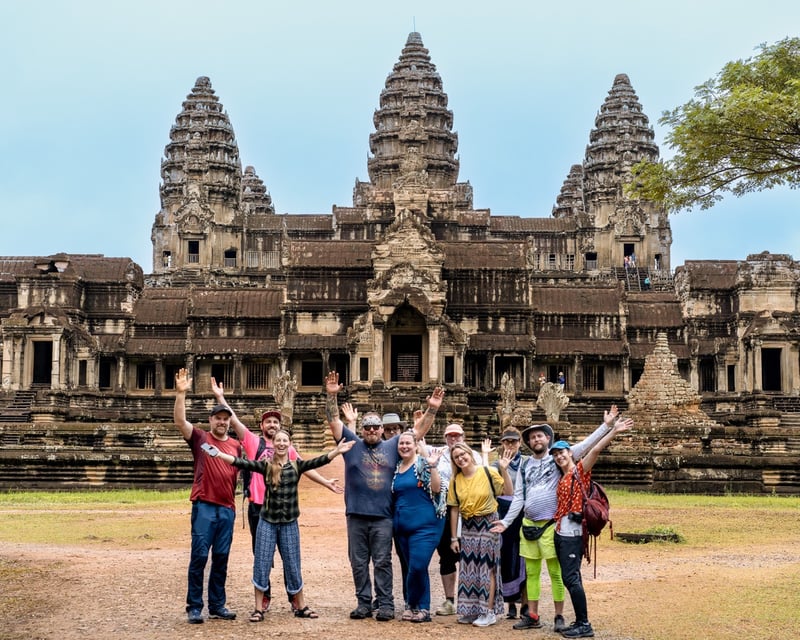Share this
Human vs. AI-Powered Travel Planning
Curious about the best way to plan a trip? The answer might surprise you, human

Unless you’ve been living in an off-grid yurt for the past year without internet access (in which case, epic), chances are you’ve had a front-row seat along with the rest of us to the AI revolution currently transforming society. Industries from manufacturing to entertainment are going through their biggest changes in a generation, maybe ever, and travel is no exception. So let’s dive into trip planning with AI!
Programs like Dall.E and ChatGPT have opened the door to creativity and automation on a scale the world has never seen…along with questions about how they’ll change life as we know it. Everyone has a piping-hot take about the future of humanity, but for now, let’s put the existential stuff aside and focus on what the growing popularity of AI means for the travel sector–for both Hosts and Travelers–specifically when it comes to planning your next trip.
Key takeaways
- Artificial intelligence is a helpful and established part of travel planning, in fact it has been used for years in ways most of us never even noticed.
- AI travel planning is a great tool, but it has limitations due to a lack of understanding about current events, the human experience, and its tendency to discern what is factual vs. fictional information.
- By combining human insight with artificial intelligence, TrovaTrip is able to create the most efficient and enjoyable itineraries for our Hosts and Travelers.
- An unforgettable group trip is so much more than just an organized itinerary. Trip planning with AI will never be able to account for human connection.
- The future of the travel industry with AI will continue to evolve, but people will always play an essential role in creating human experiences.
The future’s been here
For some, the mere mention of artificial intelligence conjures up images of Terminator robots and soulless dystopias. Totally understandable, but the reality is an AI-reliant future looks more like, well, the world as it is right now. While its ability to generate human-like content is new, AI’s been here long enough that a lot of what it does feels more industry-standard than wave of the future.
To get a feel for the role AI plays–and will play–in modern travel planning, a little context is necessary. Most of us plan trips from the couch, so before we talk about where we’re going, let’s take a look back at how far we’ve come. And how much our digital friend AI has changed the game.
Once upon a time, in a distant age known as the late 20th century, planning a trip took a lot of work. People journeyed to places called “travel agencies” where they would meet with “agents” and look at brochures to choose a destination. The agent would search for flights on a special system no one else could access and leaf through a massive tome to find lodging and guides. Price was not questioned. After hours of planning, travelers would return home and simply hope for the best. If that sounds like a drag, it was. But for years, it was the only way for most people to take a trip.
Then…the Internet.
Suddenly people could search on their own, read reviews, and even book flights and make reservations. It was far from perfect, as anyone who remembers the lovely sound of dialup can attest–Gen Z, if you’re wondering, just imagine rave music crossed with a garbage disposal–but it was a step toward today’s era of travel. Fast forward 20 years or so, and we have sites that hunt for low fares, chatbots that answer questions, automatic suggestions for hotels, searchable lists of activities, targeted ads for trip essentials, algorithms that know where you’re interested in going, and more. And while it might not feel cutting edge now, trip planning with AI is already baked into the process on a basic level and handles the grunt work with ease.

Total reliance on AI does not compute when it comes to travel planning
That brings us back to the present, where users have discovered that, in addition to helping book travel, AI can also plan it for you. With a single prompt, AI travel planning instantly generates free itineraries for any destination in the world. So that’s it, right? Travel planning has achieved its final form! Well, not quite. AI travel planners can design trips faster than a human, but the question facing us now is whether they can design better ones.
After all, for everything AI does well, its limitations are…significant. Take for instance the lawyer in New York who made headlines for using ChatGPT to help write a brief. In it, the program cited several different cases. When asked if they were real, it claimed they were. When asked for sources, ChatGPT insisted they were found in trusted legal databases like LexisNexis, which was a complete fabrication. As it turns out, in real-life situations AI has a casual relationship with the truth, and if there’s anything worse than having to explain yourself to a judge, it’s probably looking for a fake hotel or imaginary guide in a foreign country.
The other thing to consider is whether trip planning with AI will actually be worth investing your time and money in. If traveling is about enjoyment, then using AI itineraries can be problematic because artificial intelligence doesn’t actually “enjoy” experiences. It can identify what’s popular and optimize a schedule, but the things that make a trip worth taking–the thrill of exploring, moments of unexpected joy, time to bond with others, and memories that will be cherished for a lifetime–aren’t part of a virtual travel assistant’s equation. It might take a little longer, but the human ability to intentionally weave those elements into a plan is what makes the difference between a trip that’s actually good and one that’s just good on paper.
The best of both worlds
As much as we’d love to put a stamp on the whole “will AI save travel or ruin it” debate, the reality is that it depends. AI is just a tool, and its effect on industries comes down to how it’s used. While some folks want to stick with tradition and others want to chase trends, we’ve found that the most effective way to operate is to make like Diamond Rio and meet in the middle. Enter our Trip Experience team at Trova…
When trip planning with AI, use it to build a foundation of optimized processes and take some of the guesswork out of trip design, all while keeping things just as human as they are efficient. "AI is a great way to maximize the efficiency in which we do research. Instead of blindly scouring the internet for ‘best food activities’ or ‘which neighborhoods to visit’ in a specific destination, AI is a great starting point from which we can build off of," says Vivian Lei, Trip Designer.

Our team of Trip Design elves then apply AI in tandem with survey data from nearly 488k interested Travelers (2017-2023) to pinpoint exactly what our Hosts and their communities want—allowing us to stay rooted in research and cultivate the most incredible group travel experiences by:
- Experiencing activities personally whenever possible
- Implementing pacing that takes into account human needs
- Extensively and continually vetting operators
- Correcting for AI biases
- Understanding travel’s unspoken rules by destination
- Planning for the unexpected
- Altering itineraries based on breaking news and current events
- Weighing convenience, safety, and privacy when making decisions
Vivian further explains, "When considering pacing and flow while designing a trip, it isn’t just about squeezing in as many activities into an itinerary as possible. What is an integral part of the process is the consideration of the nuances of the human experience and accounting for it. People are tired, late nights out don’t always lend themselves to early mornings, how long can one comfortably sit on a bus, and so on."
In addition to the activities, AI travel planning can’t find the best local Guides, which are a make-or-break part of the trip as well. "Part of what we do on inspection is having those face-to-face conversations with the Guides on the ground. There is something about an in-person ‘vibe check’ that just can’t be replicated by AI,” says Vivian.
The result of all that? Travel that feels effortless, hits every must-see destination, and remains meaningful long after the flight home.

The human element
Now you might be thinking, “Sure, AI misses the mark with individual travelers but it’s probably better for groups, right?” On the surface, that would seem to make sense. After all, one of AI’s travel planning strengths is the ability to suggest broadly appealing activities and accommodations. However, what we’ve found is that the larger a group gets, the more pronounced AI’s impersonality becomes. As with solo trips, it’s great for building a foundation of possibilities, but recognizing the need for human chemistry and encouraging it isn’t in AI’s wheelhouse.
As anyone who’s taken a group trip (or even traveled with 1 other person) knows, #vibes can make or break the whole experience. The most perfect location in the world just isn’t the same if you’re stuck sharing it with a bunch of people you just don't connect with. And while there are no guarantees, a human-designed itinerary brought to life by a TrovaTrip Host with a like-minded community can go a long way towards creating that once-in-a-lifetime travel magic. That might sound a little out there–a little woo woo if you will–but after seeing friendships, relationships, and even a marriage proposal result from it (spoiler alert: she said yes!), what else can we say? It’s easy to believe in what’s possible when the right mix of people is brought together on an adventure designed just for them. That’s something AI travel planning doesn’t offer because, while artificial intelligence might know where you want to go, it has no idea why…or with whom.

But wait, what is a TrovaTrip Host?
The generally accepted definition of the word “Host” is “a person who receives or entertains other people as guests.” At TrovaTrip, a Host means something a little different. As co-founder and CEO Nick Poggi put it, “A TrovaTrip Host is a Creator, topic expert, or entrepreneur who wants to develop deeper connections with their community by leading them on unforgettable adventures around the globe.” And our platform allows them to do just that.
While both definitions involve a leadership element, the word takes on a richer meaning in the context of group trips. Co-founder and CCO Lauren Schneider adds, “Trova Hosts remove the fear of booking a group travel experience by providing a sense of familiarity.” In a sense, making travel a possibility for people who never thought it could be for them.
By connecting these lovable Content Creators with some of the top Trip Operators across the globe, TrovaTrip allows our Hosts to run unforgettable trips all around the world with their communities—taking online connection, offline. A real win in the digital age if you ask us!
Learn more about how the TrovaTrip business model works.

The more things change…
Picture this: It’s the year 2100. Inspired by stories of your adventures, your grandchild is considering a TrovaTrip to Mars. As they look over the itinerary–hiking Olympus Mons, visiting Mariner 9’s crash site, touring the canyons–they wonder if using a travel company is really necessary. Why not just have their trip-planning AI robot plan it and save some money?
Rest assured, when that day comes, our answer will still be the same: Travel requires human insight because it’s a quintessentially human experience. The technology we use to plan trips will keep evolving, making even more of the busywork outdated. But no matter what changes, the best trips will always be those built to make us feel safe, connected, and happy. You know, the kind of things that can’t be artificially planned for. But why wait until 2100 to find out? Right now, there are over 650 trips that allow you to travel with your favorite Content Creators and the community you are already a part of.
Or, if you're a Creator looking to host a trip, you can choose from 150 itineraries that span across 50 countries, made for every lifestyle and community to get the most out of exploring the world together.
Book a trip or host a trip, and experience firsthand how Trova is changing the way people travel.
- June 2025 (1)
- April 2025 (2)
- February 2025 (1)
- January 2025 (1)
- October 2024 (1)
- September 2024 (2)
- August 2024 (1)
- July 2024 (2)
- June 2024 (2)
- May 2024 (1)
- April 2024 (3)
- March 2024 (7)
- February 2024 (3)
- December 2023 (2)
- November 2023 (1)
- September 2023 (1)
- August 2023 (2)
- July 2023 (2)
- June 2023 (10)
- May 2023 (4)
- April 2023 (1)
- March 2023 (3)
- February 2023 (1)
- December 2022 (1)
- October 2022 (2)
- August 2022 (4)
- July 2022 (1)
- June 2022 (2)
- May 2022 (1)
- April 2022 (4)
- March 2022 (7)
- February 2022 (6)
- January 2022 (5)
- December 2021 (29)